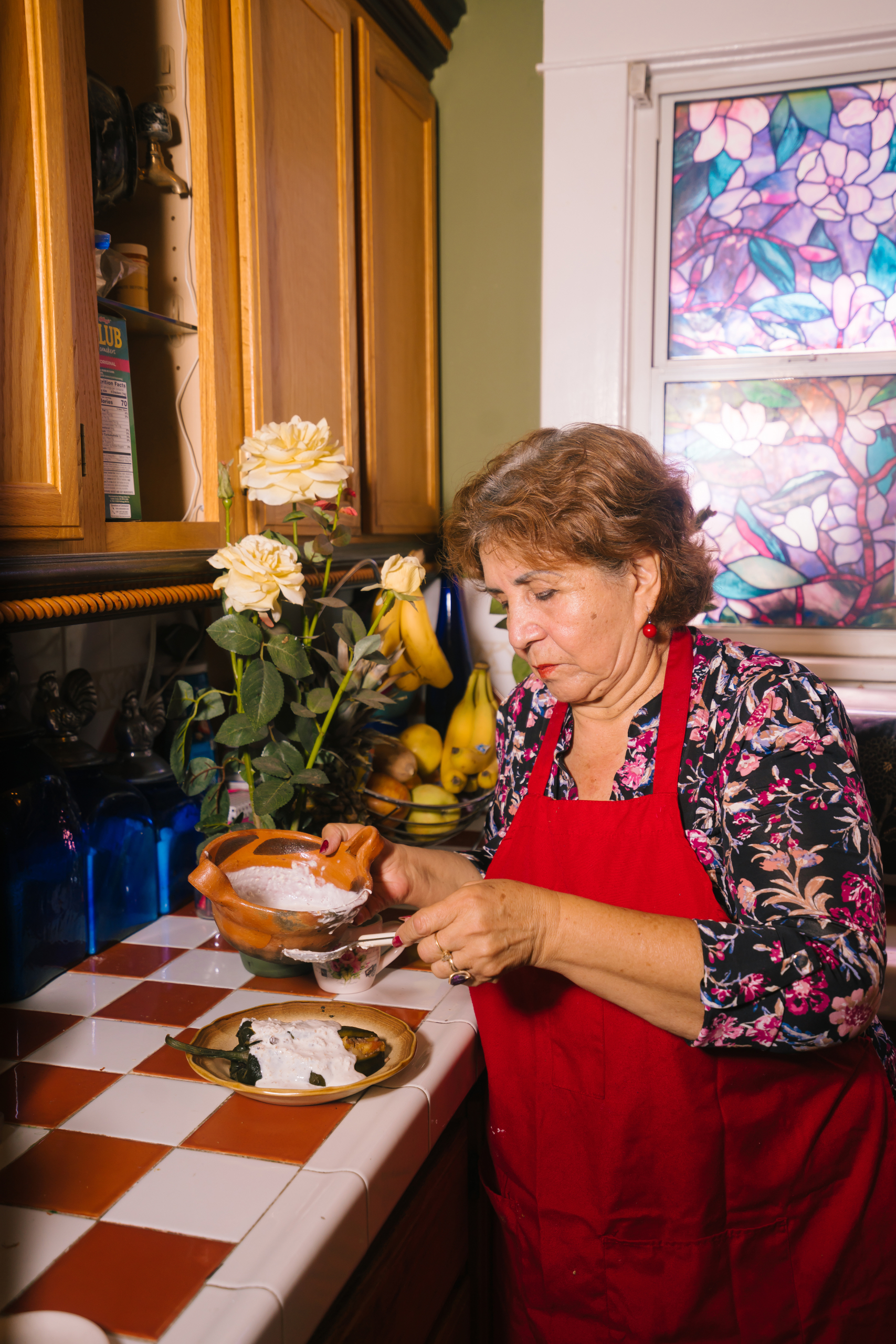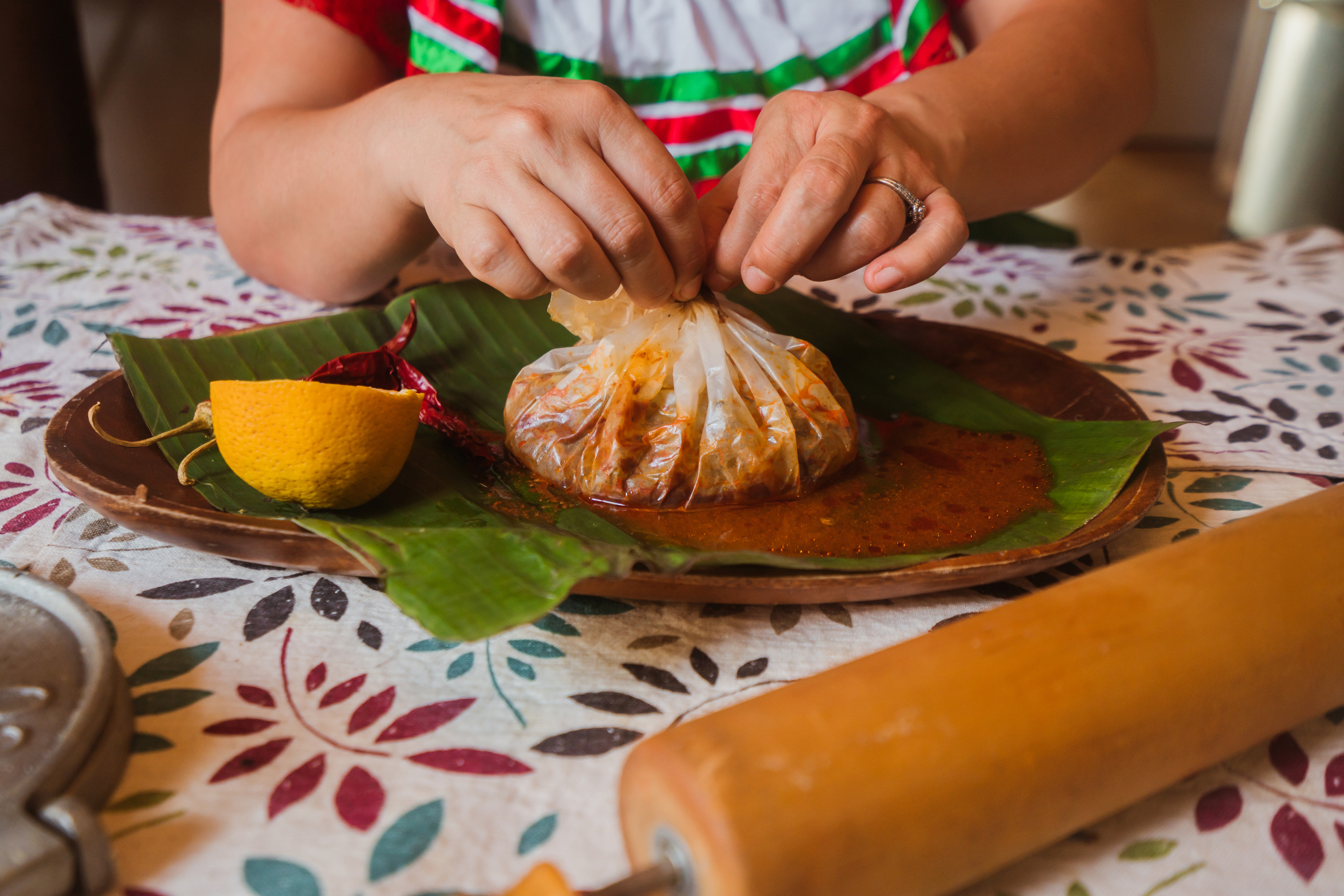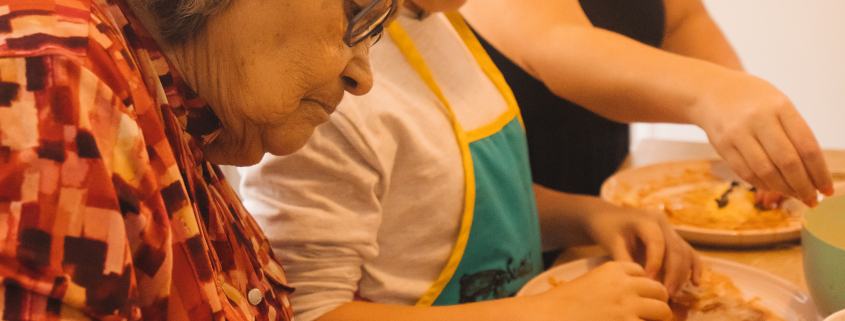Exhibit spotlights the magic of Mexican grandmothers’ kitchens

When cooking with her paternal grandmother as part of an exhibit for the Los Angeles Plaza Cocina museum, Amara Aguilar learned more about her than ever before. While discussing her grandmother’s upbringing and remembering her great great grandmother, Aguilar, a professor of journalism at the Annenberg School for Communication and Journalism, asked her grandmother about the secrets to longevity — the woman had lived to reach 93 years of age.
As Aguilar now recalls, her grandmother, Rachel Aguilar, replied, “We ate fresh food.”
Interviews with Aguilar’s grandmother and others are now on display at the “Abuelita’s Kitchen: Mexican Food Stories” exhibit at the L.A. Plaza Cocina Museum, which captures Mexican grandmothers’ stories and the generational impact of food culture. The exhibit is the brainchild of Portnoy, a professor of Spanish, whose work focuses on the food culture of L.A. and Mexico, with the input of Ximena Martin, director of public programs at L.A. Plaza de Cultura y Artes.
The exhibit features the recipes of 10 grandmothers from different regions of Mexico alongside the kitchen products used in their cooking processes. Accompanying these are QR codes that link to audio clips of the grandmothers introducing themselves and sharing bits of their histories in California. Portnoy and her team also filmed a documentary capturing clips of the grandmothers’ cooking and sharing their personal recipes to accompany the exhibit.
The idea for “Abuelita’s Kitchen” came to Portnoy when she heard that the L.A. Plaza de Cultura y Artes Museum was searching for an exhibit idea focusing on Mexican cuisine for L.A. Plaza Cocina. Portnoy said she expressed interest in an exhibit about the food stories of Mexican and Mexican American women, which the museum accepted in stride, assisting in the creation of an exhibit focused on Mexican grandmothers. Portnoy and the museum then agreed to collaborate on what would become “Abuelita’s Kitchen.”
The project was funded by California Humanities, a foundation that connects Californians to ideas about their shared heritage and diverse cultures, from which Portnoy received a grant to create the exhibit and the accompanying documentary.
Portnoy spent last fall finding and interviewing 10 Mexican grandmothers for the exhibit and documentary with her team of USC alumni. Portnoy said she wanted to represent Mexico’s diversity, and so conducted interviews with grandmothers from various backgrounds, including Afro-Mexican, Indigenous and Mexican American backgrounds.
“I would spend the first hour or so just interviewing the person about not just their food stories, but their story about migration — ‘What was your childhood like? Who do they learn to cook from?’” Portnoy said. “You think it’s gonna be just about people’s food stories, but it’s so much more. It’s things about domestic violence cases, childhood hardships, all kinds of things and just the challenges of migrating and adapting to a different culture.”
Intermixed with stories of struggle and toil, the grandmothers spoke about the pride they have in their cultures and backgrounds, Portnoy said. Some grandmothers interviewed shared their experiences as descendants of escaped African slaves, while others talked about preserving their Indigenous languages within their families. No matter what their background and story, Portnoy said, the grandmothers were proud of where they came from and hoped to pass down their heritage.
In an extension of her passion for California’s food culture, Portnoy taught a class about oral histories and identity with Aguilar in Spring 2022. Through the class, titled “Recording the Voices of Latinx Women & Food in Los Angeles: A Multimedia Oral History Project,” students created the interactive media for the exhibit, which highlighted the grandmothers’ identities and their personal histories.



“We were able to take those themes and actually, through QR codes, integrate some of the audio right into the exhibit that people could scan with their phones,” Aguilar said.
Aguilar, who specializes in Latinx storytelling, said the topic resonated with her students in the class, as they learned about their own cultures and explored stories new to them throughout the semester. Students delved into various cuisines through visits to Boyle Heights, an L.A. neighborhood with a long Chicano history, and the L.A. Times Kitchen Studios.
“It was really a blend of food in L.A., the history of L.A. cultures and traditions, Latino culture, and also media and media production and producing content for Instagram and social media as well,” Aguilar said.
Aguilar highlighted the importance of preserving Mexican culture with oral stories and fostering public understanding of the role grandmothers play in their households.
“It’s critical to preserve these stories and to honor the traditions of our grandmothers. They aren’t going to be around forever, but we want to make sure their traditions are passed on from generation to generation,” Aguilar said. “Many times, they are the anchors of our families and every single abuela I’ve met for this project is absolutely amazing.”
Andres Quintanar, a rising sophomore majoring in neuroscience and economics, grew up in a Mexican American household where his grandmother would often take care of him while his parents worked. Mexican grandmothers, he said, are the backbone of the family, and the cultural food they live around and create is a reminder of home whenever he eats it. The food each grandmother makes has a unique flavor to it that can’t be compared to restaurant-made food, Quintanar said, and is one of the most memorable parts of his childhood.
“The Mexican grandmother, I want to say, is always seen as strong,” Quintanar said. “I know my grandmothers are strong and everybody views them as so because, oftentimes, they don’t have the easiest lives. A lot of them grew up on farms … having to do a lot of hard work at home.”
Quintanar’s grandmother regularly made him Mexican dishes, such as flautas, a dish that consists of rolled up tortillas filled with food such as chicken, beef or cheese. Quintanar also remembers his grandma’s atole, a drink made of ground corn. The experience of Mexican food, Quintanar said, is heartwarming and something he wants to pass down to younger generations.
“I know a lot of the new generation doesn’t necessarily cook as often as the older generations, but I personally really want that to carry into my own family,” Quintanar said. “I’ve even explicitly asked my grandma for her recipes, and I wrote them down on paper. Even since I was little, I would always ask because I felt like I didn’t want to necessarily depend on anybody to cook good food, I wanted to just know how to cook my grandma’s food.”
The passing down of recipes through generations is something that Aguilar also valued, though she wasn’t able to obtain her maternal grandmother’s recipes. Although she remembers the food her grandmother made as a child, the recipes were lost after her passing, Aguilar said. During the “Abuelita’s Kitchen” project, Aguilar got the chance to cook enchiladas with not only her paternal grandmother but also her daughter and father.
“It’s been really special because it’s intersections of generations, intersections of culture, intersections of tradition and intersections of family and food,” Aguilar said.
Correction: A previous version of this article stated that the exhibit is the brainchild of Sarah Portnoy and Rachel Aguilar. The article has been updated to reflect that the exhibit was conceived by Portnoy with the input of Ximena Martin, director of public programs at L.A. Plaza de Cultura y Artes. The Daily Trojan regrets this error.

